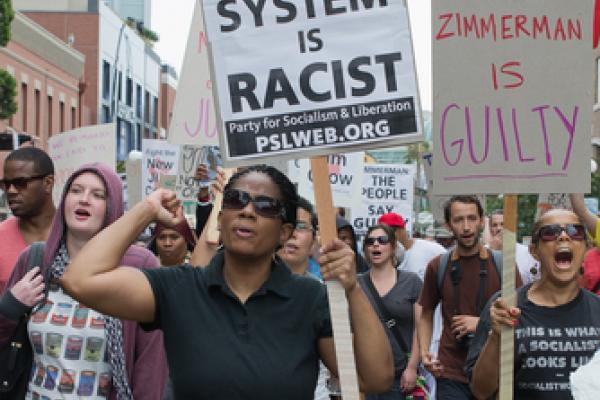Several years ago, Michael Emerson and Christian Smith criticized the quick-fix approach to racism found in the evangelical race reconciliation movement. They noted that evangelicals tended to address systemic racism through promoting interracial interactions at one-time events such as Promise Keepers rallies. Ironically, this approach tended to increase rather than decrease racism because it gave white evangelicals just enough exposure to people of color to think they now understood race without enough systemic interaction to expose them to the endemic nature of racism. They suggested instead that the preferred response was to engage in political and legal advocacy in order to change the institutional nature of racism. However, what they failed to address in that book is that political and legal approaches to race often suffer from the same quick-fix approach.
Today, we see the same quick-fix dynamics in the outcome of the George Zimmerman trial. Some are focusing again on developing interracial interpersonal relationships, while other evangelical groups have focused on legal advocacy. But in our rush to promote a “solution,” we may end up creating more harm than good. I believe evangelicals have the possibility of addressing racial injustice in a more creative way that could get more closely to the roots of the problem if we took the time to think creatively.
With so much organizing focused on repealing Stand Your Ground laws, the issue that remains is: if Florida did not have these laws, would the outcome of the case be any different? Much of the media coverage has focused on the fact that the jury instructions used the phrase “stand your ground.” However, this instruction simply relies on a basic “no duty to retreat” presumption that is actually the rule in the majority of states, so it does not make too much sense to target Florida.
There is some misunderstanding about this “no duty to retreat.” For instance, Charles Blow claimed in theNew York Times that Stand Your Ground allows a right to kill that “extends to an initial aggressor.” Thus, there is the presumption that Stand Your Ground allows individuals to proactively attack people and claim self-defense. In fact the actual statute 776.041 specifically states that SYG is NOT available to the initial aggressor. Furthermore, SYG is only available if the person “reasonably” believes that he is in imminent danger. Thus, for the jury to believe Stand Your Ground applied to Zimmerman, they must have decided that Trayvon Martin and not Zimmerman was the aggressor. They also must have thought Zimmerman had a “reasonable” belief his life was in danger.
The larger problem is the standard by which self-defense claims are judged. It is supposed to be "neutral" but is always decided by juries based on race, class, and gender. The difference in jury outcomes for the Trayvon Martin vs. Marissa Alexander cases demonstrates that the problem is not just a particular law but the manner in which the law claims to be neutral but is in fact never applied neutrally. If the issue really was Stand Your Ground, then Alexander would not be spending a 20-year sentence for firing warning shots at her abuser. Her claims to self-defense were completely rejected by a Florida jury.
The fiction of legal equality presumes that all peoples are equally situated within this country. Racial and class distinctions are presumed to be in the realm of “personal” and “private” bias that is supposed to beyond the reach of the law. As long as the law claims to be neutral, it is not concerned if individuals or systems inequitably apply the law. In fact, as seen in a multitude of Supreme Court cases on discrimination, the law is expressly prohibited from taking systemic inequality into consideration.
Does this mean we should not consider reforming Stand Your Ground or any other laws? By no means. But we should take the time to fully study the issue and consider all the unintended consequences. Some questions we might ask: Have there been any racial disparity studies comparing duty to retreat states with no duty to retreat states? Does having a duty to retreat actually lead to less racially disparate results? What are the impacts of duty to retreat laws on sexual/domestic violence survivors asserting self-defense? How does no duty to retreat affect people of color asserting self-defense? Are they more likely to lose a self-defense assertion because they are more likely to have been viewed as being able to retreat?
It is so important for us to fully consider the unintended consequences of what we advocate. It has been my experience after working for more than 20 years in the anti-violence movement that the laws we propose often backfire.
When a crisis happens, like the George Zimmerman acquittal, it is easy to begin reacting immediately without taking the time to fully explore and strategize around the issues. We want a quick fix to stop the problem. We want a simple campaign demand that we can easily mobilize around. But in the end, Trayvon Martin was not unique. Anti-blackness is endemic in our society and legal system. Eradicating racism that is so deeply institutionalized in our society will not happen quickly. But we who claim an allegiance to a God that exists beyond the constraints of the world have the opportunity to think outside the box and think creatively about how we can begin to address the systemic nature of racism.
This post was featured in Sojourner’s monthly Faith in Action newsletter, which you can join by clicking here.
Andrea Smith is a board member of North American Institute for Indigenous Theological Studies.
Image: Protestors in San Diego react to the George Zimmerman verdict on July 20, betto rodrigues / Shutterstock.com
Got something to say about what you're reading? We value your feedback!
